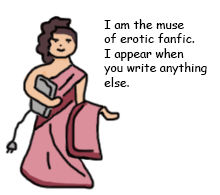There’s a instinct in us as new writers, to tell the story completely. To tie up all the loose ends, say, or to make sure we describe not just how the characters get from the house to the restaurant, but how they get into the car. We want to be thorough.
We don’t know we’re sucking the joy out of our story.
This can be compounded by workshopping. Unskilled critics won’t know what to say, and feel compelled to say a lot – how else to prove their worth as a critique partner? The easiest solution for them is to ask questions whenever possible. Unskilled writers then feel compelled to answer all the questions.
Don’t Give Us Everything
Besides padding things out with uninteresting bits your reader will want to skim, this also locks the reader out of imagining details.
Back in the late 90s/ early 2000s when the first full 3d environment video games were coming out, I and my husband had a long talk about how disappointing they were. “I had more of a feel for there being a real world behind the pixels in Zelda,” Brian said.
“Because they give us so much, you assume it’s all that’s there,” I replied.
And that’s just it. If you describe every piece of furniture and the walls and the lamp and the rug… well, the reader is going to be stuck trying to juggle all that information and parse which is important, but they are also not going to be invited to fill in the details.
Compare these two descriptions of the room I’m in now:
The ten-foot by six-foot room at the base of the attic stairs is not much more than a fattened end to the hallway, wrapping around the stairs and a narrow closet. We painted the walls a golden yellow and tried to highlight this shade via sponge painting back when we got the house in 2001. Sponge painting was all the rage, then. We were too tentative, the lavender and “fierce mango” highlights are only visible if you really look for them. Still, the texture hides a few places where we had to re-paint because of chipped paint. This had been our daughter’s room for a while, and she put up strips of LED lights that left marks along the ceiling which are now filled in with “fierce mango” and look rather like a shadow. My desk is glass and grey powder-coated metal, from Office Max, it looked more sturdy and reliable than the particle board and wood-laminate versions. Brian’s desk is second-hand particle board laminate in “oak” the mid-tone brown faux wood showing white and yellow wear on the edges. We sit back-to-back, each desk up against the short walls of the room. The long wall contains a window, a bookcase, a small side table, and a radiator. Over my desk is a poster of the Iron Giant and a whiteboard. Over Brian’s desk is a small but colorful landscape purchased at an art fair.
Example A
Our cluttered home office is full of untidy shelves of books, and two cheap desks burgeoning with nerdy art and keepsakes. There’s hardly room for our back-to-back chairs between it all, but the sun shines cheerfully through plain blue drapes on the pale yellow walls.
Example B
… which gives you more of a sense for the space? I’m really hoping it’s the latter, or I made a bad argument. If nothing else, the second example gives you the information you need quicker – it’s a small room, and cluttered, and an office. That might be all you need for the story.
Leave Some Rough Edges
But beyond the danger of giving too much information, there is also a danger in over-polishing. In trying to make it “perfect.” I’ve been in a few workshops where people were allowed to re-submit work… and I’ve seen work that started out flawed get polished to mush. It was a slow process, each draft mushier until you reach the point it’s no longer recognizable as a story and I as a critic can only suggest starting over.
Here’s an awkward fact: the most successful stories are flawed. In fact, I’ve even heard my friend Charlie once say, “He’s a good writer, but he’ll never be great; he’s too polished.”
Put down your 20th Anniversary Delux Edition of The Davinci Code and listen: we like bad books. Possibly because they are bad.
I first noticed this in my fanfic reading habits. Some fan-fictions are incredibly well-written, on par with anything you’d buy in a bookstore. Others… not so much. I was hungrily keeping up with a fic that was, well, barely coherent English, when a brilliantly polished one updated and I found myself annoyed. “Why did THAT update and not the one I really want?”
And I sat with myself and thought about it. There was something captivating in the more broken story I wasn’t getting in the more polished one. And I realized that was… me, filling in the blanks. The story that offered less scene setting, less character description, let me fill in all the details with exactly what I wanted to see there.
Let Someone Else Be Right
Then I noticed something about fan mail. (I get fan mail now! Isn’t that crazy?) I get way more letters, by an order of magnitude, pointing out some flaw in a story, even if it’s a typo, than the few which are simply “I liked your story”.
I’m not mad to get the letter explaining that I shouldn’t call the sling-catapult a “trebuchet” because it has a spring instead of a counter-weight. Isn’t that success? I’m getting actual feedback. Of course it’s when there’s something the reader gets to point out. We all know that joyful feeling, when we get to be the expert. I remember almost bursting out of my seat in a math class when the professor said, “imagine there were such a thing as a four-sided die…”
“But there is! I have one!”
No, the existence of D&D dice was not relevant to the discussion of basic probability formulae. But wow did I feel good, and it’s honestly the only clear memory I have of that class.
We have this feeling that we need to be right all the time, that we’ll be judged as lacking… but that moment where he implied he didn’t know something I did was one in which I felt warmly toward my professor. It was my only good memory of him.
Let someone else be the expert now and again, and they will love you for it, not disdain you. They don’t need to know that yes, you knew four-sided dice existed all along, you were just avoiding explaining them in a context where it was unnecessary. Like you knew the development of the term “trebuchet” and had decided to use it as modernly used on the program “Pumpkin Chuckin'” as that might be more relevant, culturally, to the characters in the story.
Let Yourself Be Comfortable With Ambiguity
John Keats wrote this little passage in a letter to his brothers, probably not knowing it would be picked up by literary theorists and turned into an Official Literary Term(TM) – “negative capability.”
….at once it struck me what quality went to form a Man of Achievement, especially in Literature, and which Shakespeare possessed so enormously—I mean Negative Capability, that is, when a man is capable of being in uncertainties, mysteries, doubts, without any irritable reaching after fact and reason…
Quoted from the Wikipedia page for “Negative Capability“
I think Keats is talking about something that has touched me in amateur works that try too hard to explain everything, to answer all questions: they leave no room for that nebulous area where two things might simultaneously be true, or untrue. They put tedious “correctness” before art. They are caught in the “irritable reaching after fact and reason.”
My most successful story – the one that made the Hugo and Nebula ballots – has an open ending. First readers said I “needed to resolve the strike.” I had the story read and critiqued eleven times, and all the way to the eleventh critique I was told the ending needed to be complete and unambiguous.
To be clear, the first nine attempts at an ending didn’t work and needed editing, but they did not “need” to be complete. I had to let go of that idea to write the ending I really wanted, the one that was published. I didn’t see any other way to do it. I had to let the ending be simultaneously happy and sad, however the reader’s mind read it. That ended up being my most successful story, even if, had one of my writing workshop friends been the submissions editor, it wouldn’t have sold to him.
Do you want your story to be the stuff of legends and fanfic?
It needs a flaw. It needs contradiction or unanswered questions. It needs room for the readers to insert their personal theories and opinions.
Okay, so how do you do that? It’s easy to do by accident… but how do you know you’re polishing all the good out of your story? How do you leave room for fanfic?
For me, it’s been a hard slog to stop editing to every single comment a critique partner gives me. All I can say is… give yourself permission to be sloppy. Let the brush strokes show a little. Save a few darlings. Start by refusing one edit per draft.
When the question your critique partner asks is one you don’t want answered… don’t. Your gut just might have the right of it. Or at least, you’ll create a space for someone else to be right, and correct you with fanfic, glorious fanfic.



